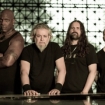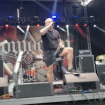In the mid-Eighties numerous bands from Belo Horizonte, Brazil, including Sarcafago, Vulcano, Holocausto and Mutilator, were part of a scene that played a scorching, blasphemous hybrid of death metal and thrash that few fans knew about internationally prior to the Internet. The groups would have a substantial impact on their peers, however.
Sepultura, too, were once very much a part of the area's death/thrash movement (though they gradually gravitated towards thrash as their career progressed). And they were clearly one of the best. The band's 1985 debut EP, Bestial Devastation, is a bombastic hybrid of Death and Kreator, and its full-length follow-up, Morbid Visions, is equally savage, even with its inferior production and sometimes sloppy playing.
But it was with the 1987 album Schizophrenia — Sepultura's first release to feature guitarist Andreas Kisser — that the group's playing and songwriting skills finally matched its energy, paving the way for them to secure an international recording deal with Roadrunner Records.
The album opens with the shower-scene music from Psycho, then bursts into the blast beats and Slayeresque death-metal riffage of "From the Past Comes the Storms." The rest of the record — which is also heavily influenced by Metallica — still sounds fresh and aggressive. Band co-founder Max Cavalera says having Kisser in the band gave Sepultura the tools and technique they needed to evolve.
"We were listening to Morbid Angel, Death, Bathory and Celtic Frost. And Andreas was more into Metallica and Ozzy," the singer/guitarist explains. "It made for a good mix, and we wrote some really cool shit. The songs got more elaborate. And we just got better. He brought really cool thrash elements to the band that weren't there before and the music became more complicated. If you listen to [the instrumental] 'Inquisition Symphony,' that song's got 500 riffs. Everything just got better."
A few weeks before the 30th anniversary of Schizophrenia's release, Cavalera talked to Revolver about the growth the band underwent between Morbid Visions and its follow-up, his first impressions of Kisser, the poor command of English he had at the time and the glam-metal fan who enabled them to up their game.
WHY DID YOU DECIDE TO BECOME LESS OF A FRANTIC DEATH-METAL BAND AND ADOPT A MORE CONTROLLED THRASH ATTACK?
MAX CAVALERA We learned to be better musicians. Morbid Visions is all about that pure black-metal instinct — that you don't need to be a good musician to make a kickass record. It's that Hellhammer mentality. As proud as I am of Morbid Visions, I think we needed something. And as it turned out, our guitar player [Jairo T] quit out of the blue. He watched that movie Crossroads that had Steve Vai in it, and he came back to our rehearsal room and said, "I don't want to do this anymore. I'm into glam music, now, like Poison, Cinderella and Steve Vai." And we were like, "What are you talking about? What's going on?" And he said, "I don't want to play this crazy music anymore."
HOW DID ANDREAS KISSER WIND UP IN THE BAND?
We met Andreas in São Paulo. He was playing in a band called Pestilence, and they were a thrash band. I saw him play and he totally kicked ass. He played great leads and could do all this Randy Rhoads stuff. So Jairo suggested we try him out. One show before Jairo quit the band, we were in São Paulo and my roadie got sick and couldn't come, so Andreas was my roadie for that one show. He'd tune my guitars and hand them to me. So I always teased him. "Yeah, you started as my roadie, man. Don't forget that."
DID YOU CLICK WITH ANDREAS RIGHT AWAY?
Honestly, man, the very first time I saw him I didn't like him at all. Me and Iggor come from poor upbringings. We're broke, never had any money. We had holes in our shoes and fucked-up clothes. The first time I saw Andreas he was riding in a convertible car with two hot chicks. And I'm like, "Look at that poser motherfucker!" He had long hair and shades. It looked like he was in Mötley Crüe. We're death-metal guys. So we were like, "That guy's a poser. Fuck that guy." But he ended up moving from São Paulo to Belo and was living with me and Iggor. My mom pretty much adopted him as a third son. For a while there, we all got along great.
CLEARLY, YOU GOT OVER THE INCOME INEQUALITY THING.
When we got to know him, we realized he's an all right guy. But he never understood where we came from. Andreas always had a nice house, good family. He always had money. He had cars, rich girlfriends. We never had rich girlfriends. All the chicks hated us. But when he joined the band things changed. The long hair and the leather pants made us look cool and it clicked. And on the music side, it was huge because he could really play.
WHAT WAS THE SONGWRITING PROCESS LIKE?
The first song we wrote was a demo that made the album as "From the Past Comes the Storms," which was really fast, heavy and crazy. But the demo had the wrong English. I called it "The Past Reborn the Storms." I didn't find out until later that it didn't make any sense. But in a way, it's kind of cool that the demo came out with the wrong English. And it came out fucking great, man. I still like the demo more than the album. The drums sound like a baseball bat. It's fucking amazing. And we wrote some real brutal stuff like "To the Wall," "Inquisition Symphony" and "(R.I.P.) Rest in Pain," which is the last song on the album. It was clear that we were becoming better musicians and could make the best out of the death and thrash mix, which, to me, are probably my favorite types of music to mix together. You get the best of both worlds and amazing things come out.
WHERE DID YOU TRACK SCHIZOPHRENIA?
We recorded at J.G. Estudios in Belo Horizonte, which is where we did the first EP [Bestial Devastation]. Schizophrenia was the first real production of the Cogumelo label. They put everything they had into it. The original album had a gatefold with a huge picture of us when you opened the album. I always think of the Schizophrenia album as being like the cover of the Scorpions' Blackout. It's got this guy breaking out of the glass, but he's got a straightjacket on. I think it's a bit of Blackout mixed with a little bit of A Clockwork Orange. I was really into that movie. The production was great and the songs were great as well and I think it entirely set the stage for Beneath the Remains.
THE LYRICS ARE PRETTY STANDARD "PSYCHO, HATE, KILL, DIE" STUFF
I was still developing my style, ripping off other music and writing from the dictionary. I was just learning and I think that's why the first song came out with the wrong English. But I think we should have kept it that way on the album. That would have been a cool touch!












